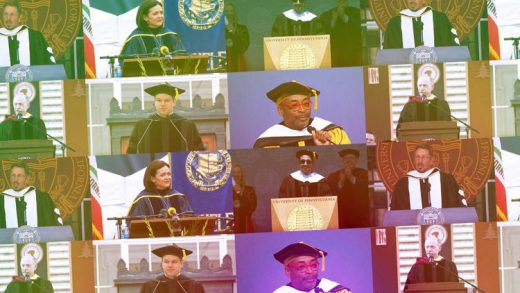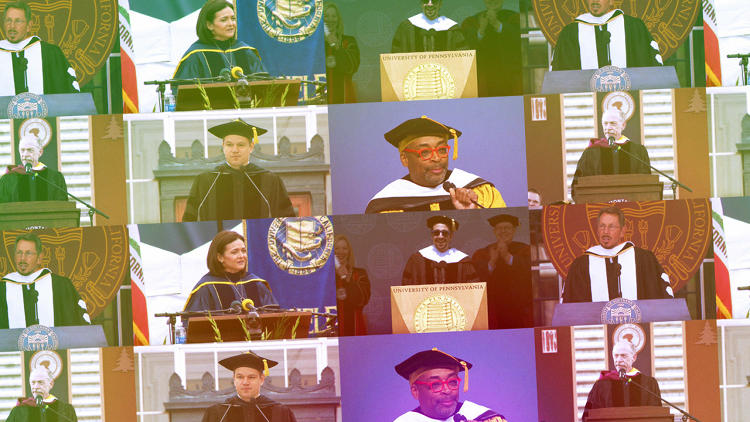The Best Advice From 2016 Commencement Speeches
College graduation is one of those pivotal milestones in life when you stand with your entire future before you. It’s also one of those moments when anyone and everyone will bestow upon you stories of what they would have done differently, share what they wish they’d have known, and talk about what they’ve learned in the years since their own graduations.
The grandest platform to extoll this advice is the commencement speech. Here are bits of inspiration from this year’s batch. You don’t need to be wearing a cap and gown to find some useful wisdom:
“Don’t Confuse Someone Else’s Dream For You With Your Own.” — Larry Ellison
Addressing the 2016 graduates of University of Southern California, Oracle cofounder Larry Ellison said he once dreamed of attending medical school, getting married, and raising a family.
“Growing up in a lower-middle class community on the Southside of Chicago, medicine was considered the pinnacle of professions; noble and humane,” he said. “Virtually everyone important in my life…wanted me to be a doctor. Over time, their dreams became my dreams.”
After a few difficult years in college, Ellison realized that medicine didn’t interest him. He moved to California and went on a journey of self-discovery, working as a river guide, rock-climbing instructor, and part-time computer programmer, and he took a sailing class.
“When my class was over, I wanted to buy a sailboat, and my wife said this was the single stupidest idea she had ever heard in her entire life,” he said. “She accused me of being irresponsible, and she told me I lacked ambition. She kicked me out. And then she divorced me.”
Ellison thought it was a reoccurrence of the same problem—an inability to live up to the expectations of others—but this time he was not disappointed in himself. “Their dreams and my dreams were different and I would never confuse the two of them again,” he said. “For the first time, I was certain that I was going to survive.”
Your job should interest and challenge you, and provide you with a sense of purpose and satisfaction, said Ellison. “If it does not, keep searching,” he said.
“The Hard Days Determine Who You Are.” — Sheryl Sandberg
Facebook COO Sheryl Sandberg spoke publicly about the death of her husband for the first time when she delivered the commencement speech to the graduates of University of California, Berkeley.
“Dave’s death changed me in very profound ways,” she said. “I learned about the depths of sadness and the brutality of loss. But I also learned that when life sucks you under, you can kick against the bottom, break the surface, and breathe again.”
Loss, whether it’s loss of opportunity, loss of dignity, loss of relationships, or loss of life, happens to everyone; it’s what happens next that matters, said Sandberg. She shared research from psychologist Martin Seligman, who found that there are three P’s—personalization, pervasiveness, and permanence—that are critical to how we bounce back from hardship.
Personalization is the belief that we are at fault. “This is different from taking responsibility, which you should always do,” she said. “This is the lesson that not everything that happens to us happens because of us. … Not taking failures personally allows us to recover—and even to thrive.”
Pervasiveness is the belief that an event will affect all areas of your life. “I remember sitting in my first Facebook meeting in a deep, deep haze,” she said. “All I could think was, “What is everyone talking about and how could this possibly matter?” But then I got drawn into the discussion and for a second—a brief split second—I forgot about death. That brief second helped me see that there were other things in my life that were not awful.”
Permanence is the belief that the sorrow will last forever. “Instead, we should accept our feelings—but recognize that they will not last forever,” said Sandberg.
The three Ps can help you recover from failures in your career, personal life, and relationships. “When the challenges come, I hope you remember that anchored deep within you is the ability to learn and grow,” she said.
“Work Hard, Listen, And Be Fully Engaged.” — JK Simmons
University of Montana graduates received their commencement speech from actor JK Simmons, who admits his advice is a little curmudgeonly: “Wherever you are physically present, to also be mentally, emotionally, spiritually present,” he said. “And by present I mean fully engaged, not staring at your damn smartphone all the time.”
More advice: “Take care of yourself: Eat your vegetables, get some exercise, floss. Use your turn signal. I know that has nothing to do with taking care of yourself, it’s just a pet peeve of mine. I needed to get that off my chest. Be on time. Please have the decency to…not make people wait for you. Take out your telephone and use it to make a telephone call. Call an old person. Call your mom. Call your dad.”
He shared these reminders of common courtesies because the path to success—however you define it—is still lined with the same principles: “Aspiration without hard work is really just a pipe dream,” he said.
“Choose Your Stories.” — Lin-Manuel Miranda
Hamilton creator Lin-Manuel Miranda addressed the graduates of the University of Pennsylvania, asking students to think about the stories they want to tell.
“The simple truth is this: Every story you choose to tell, by necessity, omits others from the larger narrative,” he said. “This act of choosing—the stories we tell versus the stories we leave out—will reverberate across the rest of your life.”
Miranda shared a story about when he was an aspiring playwright and a producer wanted him to change his storyline to add controversy. Even though he desperately wanted his work to be produced, he declined. Years later, he found someone who was able to reframe the play without compromising Miranda’s vision.
“The stories you are about to live are the ones you will be telling your children and grandchildren and therapists,” he said. “They are the temp gigs and internships before you find your passion. They are the cities you live in before the opportunity of a lifetime pops up halfway across the world. They are the times you say no to the good opportunities so you can say yes to the best opportunities.
“There will be blind alleys and one-night wonders and soul-crushing jobs and wake-up calls and crises of confidence and moments of transcendence when you are walking down the street and someone will thank you for telling your story because it resonated with their own.”
“Don’t Run From Problems; Find Ways To Solve Them.” — Matt Damon
Actor Matt Damon gave MIT students a reality check and a challenge when he delivered their commencement speech. “Before you step out into our big, troubled world, I want to pass along a piece of advice that Bill Clinton offered me a little over a decade ago,” he said. “What he said was ‘turn toward the problems you see.’”
Damon said the advice seemed simple at the time, but today he sees the wisdom.
“Don’t just turn toward [the problems,]” he said. “Engage with them. Walk right up to them, look them in the eye … then look yourself in the eye and decide what you’re going to do about them. In my experience, there’s just no substitute for actually going and seeing things.”
Damon shared his experience going to Zambia as part of the ONE Campaign started to fight poverty and disease. He also talked about visiting Zimbabwe in 2009 during the refugee crisis, where he met a woman who had been raped but had been given political asylum and was joyful.
“Human beings will take your breath away. They will teach you a lot… but you have to engage,” he said. “There’s a lot of trouble out there. But there’s a lot of beauty, too. I hope you see both. The point is not to become some kind of well- rounded, high-minded voyeur. The point is to try to eliminate your blind spots — the things that keep us from grasping the bigger picture.”
“Build Bridges Of Love Instead Of Walls Of Hate.” — Spike Lee
Director Spike Lee told the graduating class at Johns Hopkins University that they were entering the world at a crucial moment in history: “And the way I’m looking at it today, to tell you the truth, things are looking dicey,” he said. “I wish you could be graduating into a world of peace, light, and love, but that’s not the case. After you leave here today, it’s going to be real life, and real life is no joke.”
Lee said there are two words that are in almost all of his 23 films: Wake up. “Wake up from sleep, wake up from being comatose, wake up from the slumber that keeps your eyes shut to all of the inequalities and injustices. To this often more than not evil, crazy and insane world we live in.”
He urged students to leave the lofty ivory towers of institutions and become alert and open-minded. He also asked students to truly know the difference between love and hate.
“Now’s the time to seize the day, take advantage of this unique moment in history, and build bridges amongst us,” he said. “We’re talking about gender, race, religion and nations, not walls. Let us build bridges of love, not walls of hate.”
Fast Company , Read Full Story
(20)



